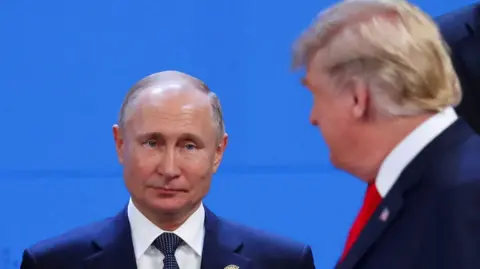Moscow Remains Composed Amidst Trump’s Shifting Stance on Putin
In the complex and rapidly evolving landscape of international relations, the United States’ approach to Russia, particularly under the Trump administration, has been a subject of intense scrutiny and frequent shifts. Analyzing President Trump’s current thinking on matters concerning Russia requires a constant awareness that his positions can change swiftly, often influenced by a single tweet, post, or impromptu remark. This volatility, as noted by Russian media, presents a challenge for those seeking to understand the underlying dynamics of US-Russia relations.
Recent communications between President Trump and Russian President Vladimir Putin, including their sixth phone call of the year on July 3rd, have highlighted a prevailing sense of “Russian-American Chill,” as described by the Moscow daily Moskovsky Komsomolets. Following this conversation, President Trump candidly stated that no progress had been made in resolving the conflict in Ukraine, expressing his dissatisfaction. This sentiment was further underscored days later when he suggested imposing a 10 percent tariff on nations affiliated with BRICS, a group that includes Russia.
The US President’s frustration appeared to escalate, culminating in strong public remarks at a cabinet meeting. President Trump voiced his irritation, stating, “We get a lot of bullshit thrown at us by Putin, if you want to know the truth,” and lamenting that while Putin is “very nice all the time, it turns out to be meaningless.”
When queried about President Trump’s statements, the Kremlin maintained a measured response. Dmitry Peskov, President Putin’s spokesperson, conveyed a sense of calm, noting, “Trump’s way of talking is generally quite harsh… we plan to continue our dialogue with Washington to mend our broken bilateral relations… we hope that Trump and his team will continue their efforts to get the peace process back to the realm of diplomacy.” This diplomatic stance, however, contrasted with the more direct and critical commentary found in the Russian press.
Russian publications did not shy away from expressing sharper opinions. Komsomolskaya Pravda featured a pundit accusing President Trump of an “absence of geopolitical achievements,” while Moskovsky Komsomolets commented on his “mercurial temperament, his propensity for sudden moods and chaotic changes of direction.” Arguments and Facts even drew a parallel between Trump’s campaign slogan and Elon Musk’s new political party, suggesting an inadvertent promotional effect.
This critical tone marks a significant shift from earlier, more favorable coverage of the Trump administration in Russia. Previously, Russian commentators had expressed optimism, with some noting that America under Trump had more in common with Russia than with Brussels or Kyiv. The business daily Kommersant had highlighted Trump’s stance as advantageous to Moscow, citing his refusal to strengthen sanctions and his commitment to developing trade relations.
Indeed, the White House had publicly criticized Ukrainian President Zelensky and exerted pressure on Kyiv, while bilateral talks between the US and Russia aimed at improving relations were underway. President Trump’s envoy, Steve Witkoff, made frequent visits to Russia for discussions with President Putin, even receiving a portrait of the US president as a gift. These interactions suggested a potential strengthening of ties between Moscow and Washington.
However, the trajectory of these relations appears to have shifted. More than two months have passed since Witkoff’s last visit, and in June, Russia announced the cancellation of the next round of talks intended to restore diplomatic missions. Concurrently, President Trump has reportedly grown increasingly frustrated by Russia’s unwillingness to agree to a comprehensive ceasefire in Ukraine.
Moskovsky Komsomolets suggested that the Kremlin perceives Trump as offering too little, making a prolonged “good quarrel” more beneficial to Russia’s long-term national interests than a “bad peace.” This implies that Vladimir Putin believes he is in a strong position to negotiate a more favorable deal concerning Ukraine, potentially seeking greater concessions on territory, Western arms supplies, and the future size of Ukraine’s army.
The question remains whether Moscow’s assessment is accurate or if it represents a miscalculation. Future developments, including the scale of US military assistance to Ukraine and potential new sanctions against Russia, will be crucial in determining the path forward. As the situation evolves, with President Trump’s actions and statements on Russia and Ukraine demanding close attention, the Russian media’s analogy of Trump changing shoes serves as a potent reminder of the dynamic and unpredictable nature of these international relations.

